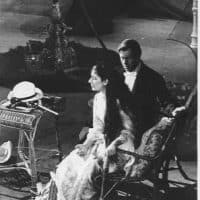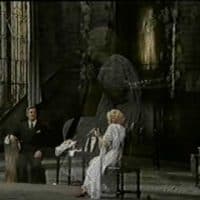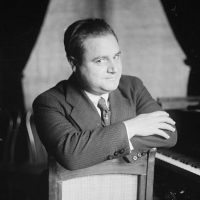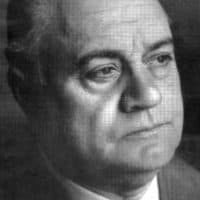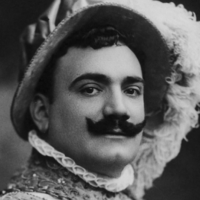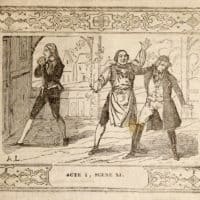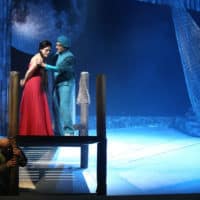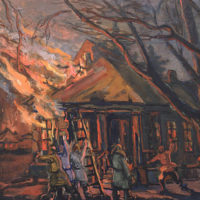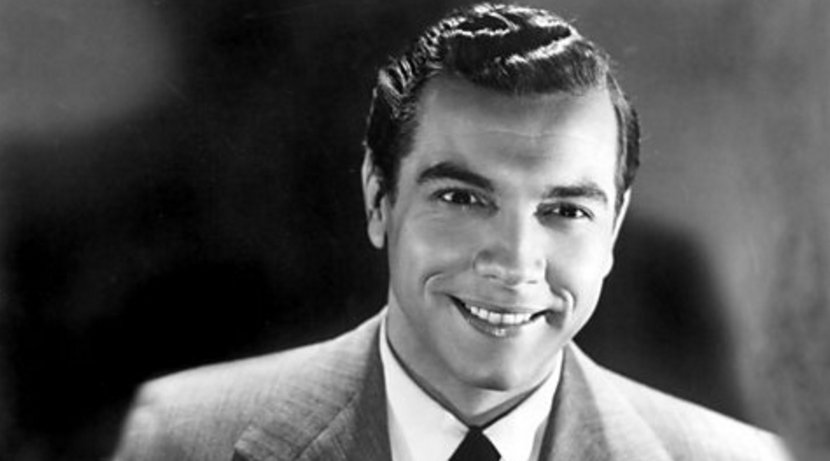
Mario Lanza possessed “one of the truly great natural tenor voices of the past century – a voice of beauty, passion, and power!” So declares Placido Domingo in his preface to Armando Cesari’s 2004 biography, Mario Lanza: An American Tragedy. Crediting Lanza’s films with doing “more to lure the general public to the art form of operatic singing than the voice of almost any other performer before his time,” Domingo also acknowledges the tenor’s impact on many of his colleagues. And yet, he observes, “Many people in the classical music world refused to recognise Lanza and actually belittled not only his impact on the public but his God-given voice.” Largely attributing such “antagonism” to jealousy and snobbery, Domingo chides the musicological fraternity for its lingering prejudice towards this vocal “force of nature.”
But attitudes are rapidly changing. In a recent reassessment of Lanza, the eminent musicologist William Park pronounced himself astonished by the tenor’s vocal prowess. “I simply could not believe my ears!” Park declared of the CD of concert and home recordings that accompanies Cesari’s biography. Singling out Lanza’s 1952 home recording of the Improvviso from Andrea Chénier, Park praised the tenor’s “superb diction, beauty of voice, [and] incredible feeling for the words.” In short, he says, it is “a magnificent rendering of the aria…certainly to be ranked with the best.”
Back in 1949 many music critics would have shared Park’s enthusiasm. The 28-year-old tenor’s rendition of Che Gelida Manina had just been voted Operatic Recording of the Year by the US National Critics Association, and indeed it seemed at the time that Lanza could do no wrong. Within a very short period, however, he would become an object of ridicule, reviled by tabloid journalists and musicologists alike. This essay examines the extraordinary rise and fall – and posthumous rehabilitation – of the 20th century’s most controversial tenor.
** ** **
Mario Lanza was born Alfred Arnold Cocozza in South Philadelphia on January 31st, 1921. The only child of Italian immigrants Antonio Cocozza and Maria Lanza, young Freddie – as he was known then – grew up listening to his father’s extensive record collection of great singers. Besotted with opera from a very early age, Freddie was 16 when his own vocal endowment became apparent, and he was soon appearing in productions staged by the YMCA Opera Company in Philadelphia. His roles at this time included Contino Del Fiore in the rarely performed Crispino e la Comare (1850) by Federico and Luigi Ricci. In 1940 he began studying repertoire with the former soprano Irene Williams.
Two years later Freddie came to the attention of conductor Serge Koussevitzky, who declared of the then 21-year-old tenor, “Yours is a voice such is heard once in a hundred years.” Koussevitzky promptly invited Freddie to the Berkshire Music Festival in Tanglewood, Massachusetts, where he provided him with a full student scholarship. It was here that Alfred Cocozza became Mario Lanza – the masculine form of his mother’s maiden name.
After just six weeks of intensive study with conductors Boris Goldovsky and Leonard Bernstein, Lanza was deemed ready to make his operatic debut, appearing at Tanglewood in the role of Fenton in Nicolai’s The Merry Wives of Windsor on August 7th, 1942.
Writing in The New York Times the following day, music critic Noel Straus hailed the 21-year-old Lanza as “an extremely talented, if as yet not completely routined student, whose superb natural voice has few equals among tenors of the day in quality, warmth, and power.” The perceptive Straus also commented on Lanza’s “first-rate” diction. The following evening Lanza appeared as Rodolfo in a staging of the third act of Puccini’s La Bohème, earning praise from Jay C. Rosenfeld, Straus’s colleague at the Times, who wrote that, “Miss [Irma] Gonzales as Mimi and Mario Lanza as Rodolfo were conspicuous by the beauty of their voices and the vividness of their characterizations.”
World War II abruptly halted Lanza’s budding operatic career. Exempt from active service because of partial blindness in his left eye, Lanza was assigned to Special Services, later appearing in the wartime shows On the Beam and Winged Victory. Following his discharge in 1945, he married Chicago native Betty Hicks, the sister of one of his army friends. Betty eventually bore him four children, and their marriage – although stormy at times – would be a successful one.
Resuming his career, Lanza worked on voice technique with his friend and colleague, baritone Robert Weede, and studied operatic repertoire with Renato Cellini. He also worked closely with conductor Peter Herman Adler, then Musical Director for the Columbia Artists Management Touring Opera Company. Adler told colleagues that Lanza had “the greatest inherent, instinctive musicality” he had ever encountered. In 1951 he prophesied that, “Ten years with the right opera company, and no one could compare with Lanza.”
In October 1945 the tenor was assigned to the CBS radio programme Great Moments in Music as a temporary replacement for Jan Peerce. Over the next four months he sang selections from works as varied as Otello and The Student Prince. Listening today to Lanza’s singing of the demanding Gia’ nella Notte Densa from Act I of Otello, one is struck by the unmistakable beauty of the voice, together with the commitment and musicality of the 24-year-old tenor’s delivery. Lanza, however, was dissatisfied with his singing, and after six appearances left the show to work on his vocal technique.
It proved a fortuitous move, for he was soon introduced to the celebrated Enrico Rosati, former teacher of Beniamino Gigli and Giacomo Lauri-Volpi. “For 34 years, since Gigli, I have waited for this voice!” the maestro declared. Over the next fifteen months, Lanza studied intensively with Rosati, acquiring a much-improved sense of line, outstanding breath control, and a solid technique that would enable him to sing for hours without tiring. As Lanza’s friend and colleague, the bass-baritone George London later remarked, “The voice [prior to working with Rosati] was unschooled but of incredible beauty, with ringing fearless high notes…Rosati directed him to singing more lyrically, with less pressure, to good advantage.”
Lanza’s voice, as Rosati had quickly discovered, was a perfectly placed lirico spinto of extended range (low A to high D) with a luscious baritonal colouring in the middle and lower registers. As the critic Henry Fogel has noted, “His voice had a uniqueness of timbre […] that made it immediately identifiable,” together with “an authentic ring [and] tonal support at all dynamic levels.” Contrary to bizarre rumours, it was also the requisite size. The vocal historian Henry Pleasants quotes George London as saying that in terms of natural vocal endowment, Lanza possessed more voice than almost any other male singer he had encountered.
 Equally impressive was the way in which he used the voice. “He could be highly musical when he chose,” writes Fogel. Moreover, “Lanza
Equally impressive was the way in which he used the voice. “He could be highly musical when he chose,” writes Fogel. Moreover, “Lanza
had an innate feel for leaning into a phrase that brings music to life.” The Chicago Tribune’s Claudia Cassidy took a similar view. Reviewing the first of the tenor’s two concerts at Grant Park, Chicago in July 1947, she observed that, “[…] although a multitude of fine points evade him, Lanza possesses the things almost impossible to learn. He knows the accent that makes a lyric line reach its audience, and he knows why opera is music drama.”
By now Columbia Artists Management had assembled what would become known as the Bel Canto Trio, comprising Lanza, George London, and soprano Frances Yeend. Between July 1947 and May 1948, the trio performed 86 concerts throughout the United States, Canada, and Mexico. Singing a demanding programme that included scenes from The Magic Flute, Faust, Simon Boccanegra, and I Lombardi, the trio received excellent reviews, with Lanza invariably singled out as the exceptional talent of the three.
The most significant concert of Lanza’s life took place during this period, when the tenor replaced an unavailable Ferruccio Tagliavini at the Hollywood Bowl. Under the baton of Eugene Ormandy, Lanza sang three operatic duets with Frances Yeend and three arias. The impact of his singing on critics and audience alike was remarkable. “The sort of tenor voice that nearly every operatic stage in the world has been yearning for so many lean years,” exulted the Los Angeles Times reviewer the next day. “Lanza’s is the warm, round, typically Italian type of voice that caresses every graceful phrase and makes the listener breathe with him as it molds each curve of the melody.” The Bowl audience presumably agreed, applauding the tenor’s impassioned rendition of the Improvviso from Andrea Chénier for a near-record twelve minutes.
The concert brought Lanza to the attention of Hollywood’s Louis B. Mayer, who promptly signed the good-looking tenor to a seven-year film contract at MGM. Listening to the tenor’s six selections today, one can readily imagine the impact of his performance on the opera-loving studio mogul. Lanza is in ravishing vocal form, singing with a splendid sense of line, and switching effortlessly from the lyric requirements of Una Furtiva Lagrimato the spinto demands of the Improvviso. In the duets with Yeend, as Armando Cesari has noted, he reveals an impressive command of mezza voce and diminuendo in Parigi, O Cara, and offers a passionate Pinkerton in Vogliatemi Bene – the highlight of the concert.
Eight months later Lanza returned to the role of Pinkerton, singing two performances of Madama Butterfly with soprano Tomiko Kanazawa for the New Orleans Opera Association. Reviewing the tenor’s opening night performance as Pinkerton on April 8th 1948, Laurence Odel wrote in theSt. Louis News:
Mario Lanza performed his duties as Lieut. Pinkerton with considerable verve and dash. Rarely have we seen a more superbly romantic leading tenor. His exceptionally beautiful voice helps immeasurably…The combination of good looks and vocal ability should prove most helpful to Mr. Lanza in any of his more earnest undertakings.
Walter S. Jenkins, writing in the Times-Pycayune concurred: “The choice of Mario Lanza as Pinkerton was admirable. His diction was excellent…[and] the quality of his voice was a delight to hear.” Lanza was booked to return to New Orleans in 1949 as Alfredo in La Traviata, but by then, as Armando Cesari observes, “he was already deeply engulfed in the Hollywood machinery and consequently never learned the role.”
Lanza’s decision to move to Hollywood would eventually prove disastrous not only for his career, but for his health and self-esteem. And yet in 1947 the MGM contract had appeared a generous one. Its terms required Lanza’s commitment to the studios for only six months of each year, leading the tenor to assume that he would be able to combine a film career with an operatic one. At first this seemed a reasonable supposition. Indeed, after signing with MGM in 1947, Lanza had continued to tour with the Bel Canto Trio, also appearing in concert with soprano Dorothy Kirsten, and performing in Madama Butterfly. In May 1949, he had made his first commercial recordings with RCA, having signed an exclusive contract with the company four years earlier.
But Lanza was ill prepared for the mass adulation that greeted his first two films, That Midnight Kiss (1949) and The Toast of New Orleans(1950), together with a string of hit singles, each of which sold over a million copies – an extraordinary feat in those days. Suddenly he was no longer a performer known only to the concert and opera-going public, but a bona fide Hollywood and recording star. For a man who had always struggled with self-discipline, the pressures of fame would prove an enormous distraction. As Cesari observes:
To develop properly, Lanza needed the strictest of artistic environments – working with the best conductors, musicians and coaches – all the while learning and perfecting his art. Hollywood could provide none of this. In the fanfare and glitter of the celluloid capital, Lanza would never be able to find the peace and solace – let alone the time required – for the study of new repertoire.
The astonishing commercial success of The Great Caruso in 1951 only added to Lanza’s problems. Music critics were now beginning to attack him, questioning his “right” to portray Caruso in view of his limited stage experience. Rumours began to circulate that he was unable to sustain an entire opera, that his voice was too small for the stage, and that he made his recordings in small pieces. His stylistic lapses were now regularly dissected: “Lanza shouts,” “Lanza over-emotes,” and so forth. Critics such as John Freestone in Gramophone – who had previously hailed Lanza as a singer “worthy of serious consideration” – began to adopt a patronising approach to reviews of “the film star’s” discs. Unable to accept that any serious singer could possibly be so popular, the critics increasingly held Lanza’s commercial success against him.
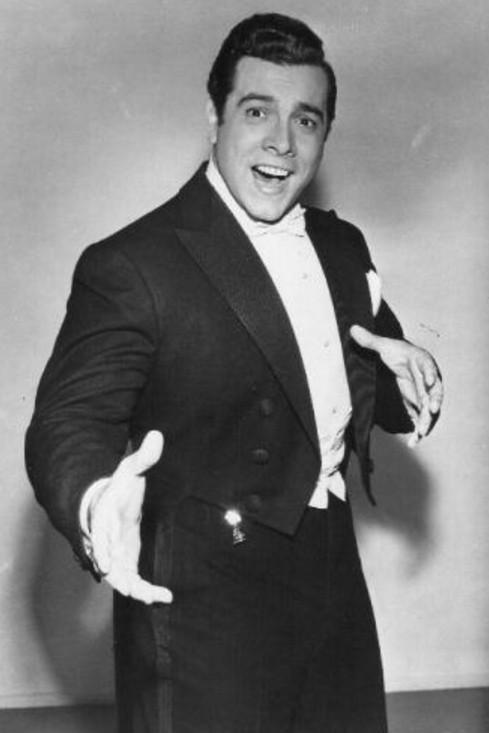 Time Magazine also joined the fray in an anonymously written 1951 cover article that not only criticised Lanza’s singing style and predicted his vocal demise, but mocked his intellect and personal habits. The impact of the article on the deeply sensitive tenor was devastating.
Time Magazine also joined the fray in an anonymously written 1951 cover article that not only criticised Lanza’s singing style and predicted his vocal demise, but mocked his intellect and personal habits. The impact of the article on the deeply sensitive tenor was devastating.
And yet Lanza’s critics overlooked the fact that The Great Caruso was, in the words of its subject’s own son, “Vocally and musically…a thrilling motion picture.” Praising the film for helping “many young people [to] discover opera and even become singers themselves,” Enrico Caruso, Jr – a tenor in his own right – also approved of its casting:
I can think of no other tenor, before or since Mario Lanza, who could have risen with comparable success to the challenge of playing Caruso in a screen biography. […] It was Lanza who made the film a success.
While the crowds idolized him, the experts and purists insisted that he was a far cry from the real thing, that he had no right impersonating the great Enrico Caruso, that he was no more than a gifted amateur who never learned to sing properly. In my opinion, this was a facile and unfair dismissal.
Mario Lanza was born with one of the dozen or so great tenor voices of the century, with a natural voice placement, an unmistakable and very pleasing timbre, and a nearly infallible musical instinct. His diction was flawless, matched only by the superb Giuseppe Di Stefano. His delivery was impassioned, his phrasing manly and his tempi instinctively right. All are qualities that few singers are born with and others can never attain.
For a time Lanza continued to perform in public, receiving the type of mass adulation previously reserved for Frank Sinatra and his ilk. But he was now reluctant to return to the opera stage, aware of the unusual degree of scrutiny to which he would be subjected by a sceptical press. “I don’t think he realised how good he was,” Giuseppe Di Stefano would later state. Indeed, Lanza was no longer the confident young singer who had arrived in Hollywood four years earlier, declaring his dream of singing Rodolfo in La bohème with Licia Albanese, Leonard Warren, and Ezio Pinza. Former MGM General Music Director John Green recalled this period:
“He was in truth as insecure as it is possible for a human being to be. He knew that God had intended him to be a great operatic singer. […] Had he been already a leading tenor, if not the leading tenor at the Met, and come to Hollywood in between seasons to make a picture, he would have had the Met as his home.”
Indeed, Edward Johnson, during the last four years of his tenure as General Manager of the Metropolitan Opera, had repeatedly invited the tenor to join the Met. By his own admission “flabbergasted” by Johnson’s offers, Lanza nevertheless declined them, feeling that he was not yet ready for such a challenge. Meanwhile, other leading opera houses approached him. In 1950 Victor De Sabata visited Los Angeles expressly to invite Lanza to open the 1950/51 season at La Scala in Andrea Chénier– a role that the tenor knew and for which he felt a great affinity. Although extremely flattered by the offer, Lanza declined, saying, “The invitation to there is a frightening compliment. [But]
I want to go to Italy and start, not at La Scala, but in the smaller opera houses first, singing in a variety of roles to opera addicts. […] I should work up in opera, and then I will feel qualified to say yes to the invitations from the great opera houses.
Closer to home, Gaetano Merola, Music Director and Principal Conductor of the San Francisco Opera, also offered him the role of Chenier, convinced that Lanza was the new Caruso. On this occasion, performances were tentatively scheduled for October 1950, but Lanza later withdrew, pleading other commitments and the approaching birth of his second child. “I’m only 29,” he had told Merola. “There is lots of time.”
Regardless of the self-doubts now plaguing Lanza, to his colleagues there was never any question of his ability to perform on the stage. As soprano Dorothy Kirsten, who worked with Lanza on The Great Caruso, reminisced years later, “He could have sung in any opera house in the world, and his career could have been sensational.” George London concurred:
In my opinion, Lanza, with the possible exception of Bjoerling, had the greatest voice of his time. His singing could move people to tears and, in my presence, frequently did. His Hollywood experience undermined his inner security, which is why he avoided performing in public. I would venture that if he had not gone to Hollywood he would, at least for the beginning, have had a major operatic career.
Such was Lanza’s insecurity by now that he did not sing again on the concert stage for six and a half years after his record-breaking tour of 1951. In the interim his film career unravelled, and with it his lifestyle. Louis B. Mayer had been replaced at MGM by Dore Schary, a man with whom Lanza repeatedly clashed over his demands for greater artistic standards in his films. Dismissed by MGM in 1952 after he had pre-recorded the songs for The Student Prince, Lanza also endured the double blow of near-bankruptcy arising from a number of bad investments made by his former manager. Pursued by the IRS for $250,000 in back taxes – and his film career now in tatters – Lanza increasingly sought refuge in alcohol. In no position, either emotionally or physically, to contemplate a return to live performing, for the next two years Lanza remained a virtual recluse.
The years of inactivity ended with his return to films in Serenade (1956) for Warner Bros. His voice by now considerably rounder and darker, but retaining its thrilling upper register, Lanza worked diligently with vocal coach Giacomo Spadoni on the operatic numbers for the movie. Perhaps inevitably – given his long period of inactivity – some of the singing was uneven, but overall Serenade represented a formidable achievement. On the best numbers, Lanza’s singing was more controlled and operatic than it had been in his MGM days. The highlights included superb renditions of the arias Amor Ti Vieta, Di Rigori Armato, and the Otello Monologue, and the Neapolitan song Torna a Surriento. The Otello Monologue is arguably Lanza’s finest operatic recording, and offers compelling evidence of the intelligence and conviction that the tenor could have brought to the role on stage.
Lanza also recorded the Act III duet Dio Ti Giocondi from Otello with the Metropolitan soprano Licia Albanese. Over 20 years later Albanese recalled their collaboration:
I had heard all sorts of stories about Mario. That his voice was too small for the stage, that he couldn’t even sing a full aria […] None of it is true! He had the most beautifullirico spinto voice. It was a gorgeous, beautiful, powerful voice. I should know because I sang with so many tenors. He had everything that one needs. The voice, the temperament, perfect diction. He also had an infallible instinct for what was good for his voice and knew exactly how to move on a stage. […] Vocally, he was very secure. All he needed was coaching. Everything was so easy for him. He was fantastic! I rank him next to Caruso. Next comes Di Stefano, then all the others.
Renata Tebaldi visited Lanza on the set of Serenade in December 1955, and later attended a screening of the musical highlights from the film. “Tebaldi was so overcome by Mario’s singing that she was moved to tears,” recalled the film’s musical director Ray Heindorf. She also spent an evening at Lanza’s home, where the two singers sang together. Her response to hearing his live voice was unequivocal. “Yours is the finest natural tenor voice I have ever heard,” she told Lanza.
Armando Cesari argues that, “In assessing Mario Lanza, the fact that his career took place mainly at MGM, instead of the Metropolitan, should not be the issue.” Instead, Cesari asserts, Lanza “should be judged purely on the evidence he left behind, which contains many recorded performances that will stand comparison with – and often surpass – those of more fortunate singers whose careers have been almost entirely devoted to opera.”
However, it needs to be said that locating Lanza’s best recordings can be a daunting task. In the first instance, his legacy is a vast one: almost 400 studio and radio recordings, most of which have been released by BMG, in addition to numerous alternate takes and a large amount of unreleased soundtrack material. And then there are the recordings known mainly to aficionados: concerts, early radio work, television appearances, and a fascinating series of home rehearsals.
The variety of genres included in this legacy is astonishing, too: popular songs, operatic arias, operetta, show tunes, art songs, religious songs, and Neapolitan and Italian songs. Although, perversely, Lanza’s versatility has often been held against him, it would be difficult to find another singer as convincing in so many different musical forms. As Enrico Caruso, Jr. observed, “Let it not be forgotten that Mario Lanza excelled in both the classical and the light popular repertory, an accomplishment that was beyond even my father’s exceptional talents.”
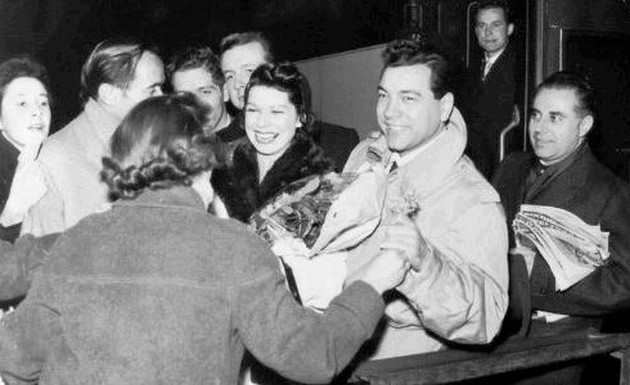
At the same time, it should be acknowledged that Lanza did make some unfathomably bad recordings. The worst of these is the 1956 album Lanza on Broadway, which as Armando Cesari observes, continues to provide incalculable ammunition to the tenor’s detractors. Some of Lanza’s 1959 recordings – although never descending to the depths of the Broadwayalbum – should also be avoided. His spirits dampened by illness, and his voice often coarsely produced, Lanza Sings Christmas Carols is the worst of the five albums he recorded in his final six months.
Lanza’s 1951-52 Coca-Cola-sponsored radio show is the other main source of substandard recordings. Although the tenor recorded many superb renditions of English songs, his singing of operatic arias and Neapolitan songs on these programmes was often below par. Sloppy, mannered, and often wildly over the top, this is the Lanza whom critics love to seize upon.
What they overlook, however, is the fact that the over-represented “Coke” material represents a mere 11-month period in Lanza’s life when his career was, in many respects, at its most chaotic. It should also be remembered that the “Coke” shows were never intended for posterity, and that rehearsal time was often minimal at best. Most of the arias and Neapolitan songs are not representative of the standards that he had already achieved in the RCA studios, and, indeed, would often go on to surpass in the latter part of his brief career. By posthumously releasing so many inferior radio performances, BMG has not helped Lanza’s critical rehabilitation.
But no one – save the most diehard of his detractors – can overlook the many great recordings of Lanza’s legacy. Scattered willy-nilly across many CDs, these include his 1949 Che Gelida Manina, the two Toscaarias, a near-flawless M’Apparì, the Improvviso from Andrea Chénier, Dio! Mi Potevi Scagliar from Otello, and the 1955 version of O Paradiso with piano.
There are also fine renditions of O Tu Che in Seno agli’Angeli, Questa o Quella, Addio alla Madre, Testa Adorata from Leoncavallo’s La bohème, and a still-unreleased “Coke” version of Cielo e Mar. Meanwhile on video,The Great Caruso is an enduring record of Lanza in exceptional vocal form, singing with many of the best Metropolitan Opera singers of the time.
Among his lighter repertoire, the tenor’s first recording of The Student Prince is his greatest, and features some of Lanza’s most poetic singing. Recorded in 1952-53, highlights from this album include the immortal Romberg Serenade, Drink! Drink! Drink!, Beloved, and I’ll Walk With God.
Lanza also excelled in Neapolitan songs. His 1958 album Mario!showcases his best efforts in this genre, including outstanding renditions of Voce ‘e Notte, Passione, and Canta Pe’ Me. These are included on the CD Mario! Lanza At His Best. Arguably Lanza’s finest album, its respected conductor, the Academy of Santa Cecilia’s Franco Ferrara, later hailed the tenor’s “great musicality,” further describing him as “vocally extraordinary with a voice that combined steel with warmth…a Caruso-type voice.”
There are also a large number of good recordings, including the poignant 1959 album Mario Lanza Sings Caruso Favorites – sung in what Lanza authority Lindsay Perigo describes as the tenor’s “most haunting ethereal voice” – and the delightful Christmas With Mario Lanza CD compilation, together with many fine performances of English love songs and operetta.
In short, it is a legacy peppered with glorious moments. An uneven legacy, to be sure, but one that overflows with passion, romance, and excitement. While those who demand stylistic perfection and an infallible sense of pitch from their singers will inevitably be disappointed by Lanza, they would do well to note the tenor’s musical philosophy: “I sing each word as though it were my last on earth.” In essence, that is the key to the tenor’s enduring appeal.
His contemporary Oreste Kirkop knew it. “Only a great heart can sing the way that Lanza sang,” the Maltese tenor once observed, echoing the words of Lawrence Tibbett, who had earlier hailed Lanza’s “natural zest and unbelievable diction.” Although the longhairs have panned him as “a movie singer,” Tibbett publicly declared in 1950, Lanza is “the greatest musical talent of America in our century. A man who is bringing great music to the kids, the farms, the ghettos, and the palaces.” In 50 years, he concluded, “people will recognise Lanza for the great artist he is.”
Many of today’s listeners – unconcerned with the prejudices of an earlier generation – may well agree.
